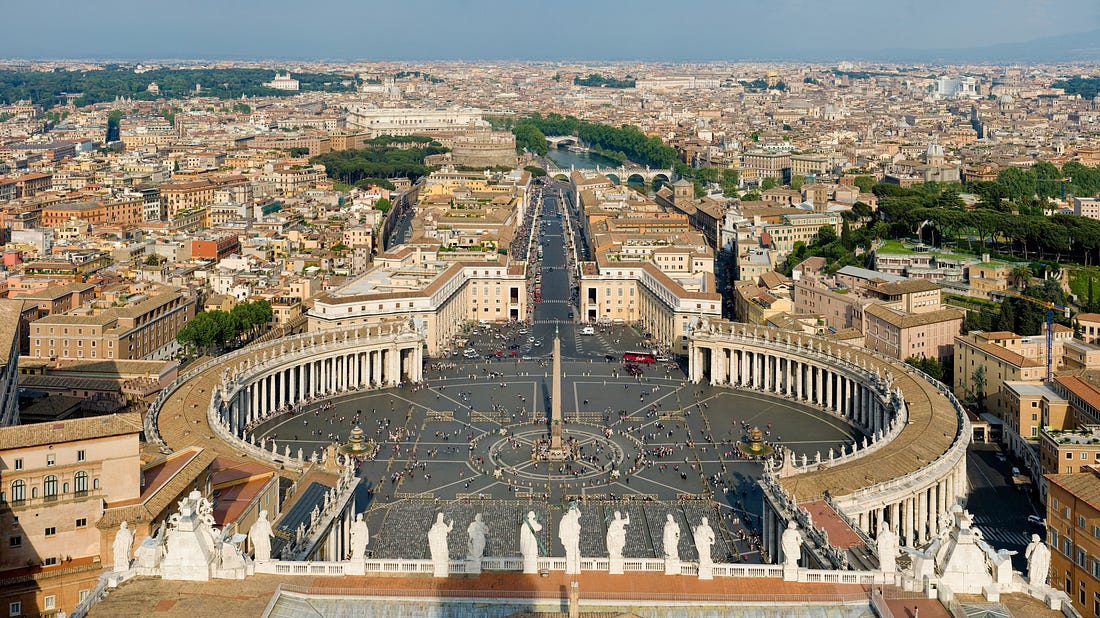|
 |
St. Peter’s Square, Vatican City, available from Wikimedia Commons
President Trump likes to claim credit for many things: the arrival of a new “golden age,” the unprecedented mandate he has received, doing more for Black Americans than any President since Abraham Lincoln, ushering in “the greatest and most successful era in the history of the country,” and causing “for the first time in American history more Americans [to] believe the country is headed in the right direction."
Adding to these credits, always stated in the superlative, he might claim to have more influence over elections worldwide than any previous president. Voters in Canada, Australia, and Germany have recently turned, sometimes dramatically, against tariffs, claims over their sovereignty, and candidates running on a Trumpian-type agenda. I now believe we might add one more election to the list: that of a new American pope.
Of course, I have no insider information on the conclave. But think about it: Trump has disrupted people’s lives in every country around the globe.
Here, another superlative is accurate: more Cardinals than ever before now come from middle and less-developed countries. They witness firsthand the consequences of the removal of U.S. aid—sometimes temporary, often permanent—for children who have AIDs and for peacekeeping efforts in war-ravaged parts of their own country and neighborhood. They must frequently stand up to their autocratic leaders rather than praise them. They don’t claim to have the “best relationship” with the “coolest dictator in the world.” They fight against the injustices of their prison systems and don’t want Americans to find them useful.
Cardinals from Eastern and Western Europe fear the consequences of bowing down at the feet of Vladimir Putin and rewarding Russia for its attacks on its neighbors, both militarily and through disinformation campaigns. They don’t want a new arms race and are concerned about the attacks on their own democratic leaders and support for political parties with a pro-Nazi past.
Cardinals from Asia worry about how praise for Chinese and other autocratic leaders undermines their efforts to protect their congregants from persecution.
Additionally, as recognized leaders in their countries, they have interacted with many State Department and USAID officials who were forced to leave. They witness firsthand the destruction of America’s soft power and the Pax Americana it helped create for eight decades.
Please don’t misunderstand me. These Cardinals voted on a leader for the Universal Catholic Church. They certainly have never yearned for an American pope, yet they are also fully cognizant of world events. Let me draw a rough analogy between this election and that of Pope John Paul II in 1978.
Beyond spirituality, John Paul II had four advantages. First, he was widely known—an increasingly important requirement with an increasingly diversified, less European-centered set of Cardinals. He had traveled the globe frequently and had met many people. Second, he exercised strong leadership. Third, he spoke multiple languages. Finally, he stood up against one of the greatest threats of the time: Communism. I don’t want to exaggerate the relationship between his papacy and the collapse of Communism and the Soviet Union, but it was clearly a factor.
Before becoming Pope Leo XIV, Robert Francis Prevost was widely known. His previous position was Prefect of the Dicastery for Bishops, the Vatican office responsible for the global selection of bishops. When he wasn’t assisting in the selection of Cardinals, he was discussing potential bishop appointments with them. He also has fluency in many languages. He has a reputation as a knowledgeable and competent administrator, possibly capable of addressing issues like the Vatican Bank. (Disclosure: as a former math major and philosophy minor at a Catholic college, I may have a “confirmation bias.”) He also speaks several languages.
Moreover, in what may, and I hope will, become a new “sine qua non” for election as pope, his life and preaching—similar to those of Pope Francis I—emphasized service to the poor.
All these factors may have been sufficient to get him elected.
But I can’t help but think that the Cardinal electors found it quite attractive to put one American in a very visible position to stand toe-to-toe with another American who, as president, promises to mete out “retribution” against those anywhere around the world who disagree with him.
One seeks enemies to destroy and finds truth inconvenient. The other speaks the words of Matthew 25 about compassion, stewardship, and accountability.
To understand the major budget issues facing Congress and the President in 2025, see my new book, Beyond Zombie Rule: Restoring Fiscal Sanity In A Broken Congress.
